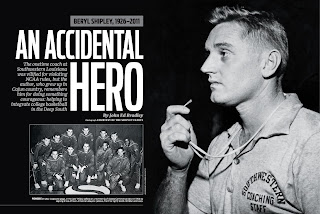

Sports illustrated nous livrait dans son dernier numéro une histoire de sport, mais surtout une histoire sociale et politique. C'est l'histoire de Beryl Shipley, coach de basketball de l'Université of Southwestern Louisiana (devenue University of Louisiana at Lafayette). Shipley a contribué à l'intégration raciale des noirs dans le sud des États-Unis. Personnage controversé, adulé et détesté, il aura l'honnêteté de reconnaître avant sa mort qu'il se tourne vers les noirs plus opportunisme que pour contribuer à la "justice sociale". Comme les meilleurs joueurs blanc ne fréquentaient pas son université, il se tourner vers les noirs. Il traitera cependant tous ses joueurs de la même manière.
"Closer to home, Shipley had trouble signing blue-chip white players, but not so top-tier black athletes, once he determined to go after them. No major Southern school even considered recruits who weren't of the right skin color, so Shipley's only competition came from programs out of the region and nearby historically black colleges such as Grambling and Southern. Shipley himself admits that he was less a civil rights trailblazer than an opportunist who recognized the value of black talent and stormed into history because of his desire to get places. "An accidental hero" is how one of his longtime friends describes him.
"Coach had an agenda," says Ivory. "He wanted to win. He didn't care if we were purple. He was going for the best athletes. I mean, I don't think it's all that heavy. He was dealing with a wrong, anyway. 'Why don't you have black athletes on your team?' 'Well, because they're black.' That argument can't hold water. So he finally decides he's going to get them. What are the circumstances? 'Well, Coach, we're going to ruin you.' 'You're going to ruin me? How long will it take for you to do that?' 'Oh, not long. About 10 years.'"
Jimmy Dykes, another of Shipley's former assistants, told me about the time he took Winkler and Ivory to lunch at a cafeteria in Lafayette during their recruiting visit. "Noon Sunday, place is packed, all white faces," says Dykes. "We're in line headed to get our trays, and suddenly everything goes dead silent. They've spotted the blacks. And then we hear murmuring, and now people are beginning to leave.
"There's a family a few tables away from ours, a big family, and they get up, slamming their chairs. The father comes over to where we're sitting. He shakes a finger in my face and screams at the top of his lungs, 'Trash! That's all you are, is white trash!' And then the whole place applauds."
After the dining room quieted down, one of the players said, "If Martin Luther King can walk into Selma, Alabama, we might as well be walking into here."
"They'll be cheering for you before this is over with," Dykes told them."
http://sportsillustrated.cnn.com/vault/article/magazine/MAG1184836/index.htm
L'histoire de Shipley me rappelle celle de Don Haskins de Texas Western. Son histoire a été présenté dans un film que j'apprécie beaucoup: Glory road. Le lien pour la fin du film: http://www.youtube.com/watch?v=VnN_WRG8Jac



Aucun commentaire:
Enregistrer un commentaire